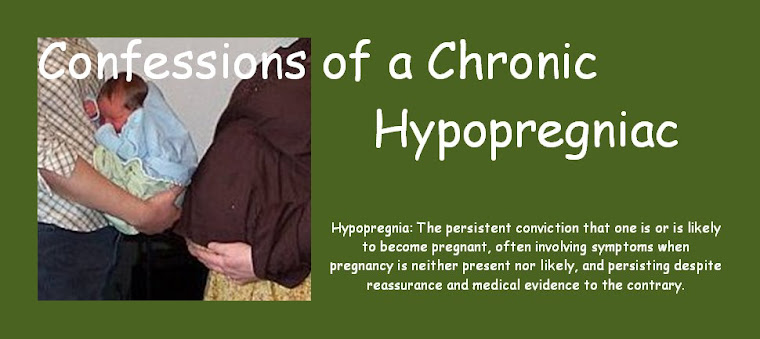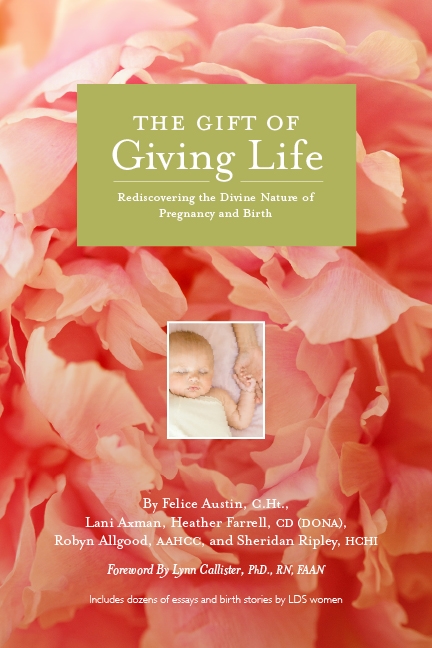The midwife, at our first meeting, lent me a book (which I very highly recommend) entitled Birthing from Within. Like Ina Mae’s Guide to Childbirth that I read when expecting my daughter, it is also very empowering, but went beyond “natural childbirth is a wonderful and awesome and doable thing” to actually walking you through ways you can prepare yourself, mentally and psychologically, because when it comes down to it, there’s not much you can do to prepare physically. It suggested ways to explore and discover what you really think and believe about childbirth and to work through and get over anxieties or hang-ups that you may have. One thing that the author said that I had never thought about before was that the mothers who absolutely do not worry at all are the most likely to have problems. She said that that was her at her own first birthing experience, and that things ended up going horribly for her, at least emotionally, and I realized that that was me, as well. I had been so calmly confident before my daughter’s birth that I hadn’t seriously thought through divergent scenarios, especially not that it may eventually end with a C-section. Consequently, when something didn’t go exactly as I had envisioned it, I was left with nothing to guide myself or my choices, so the choices that were made were not necessarily the best. I realized that while I had changed the circumstances under which I was going to birth this time, I still had not done anything to prepare myself for the possibilities that still existed for this birth.
I think the biggest reality that I finally acknowledged was that it might get to a point that I couldn’t handle it. That probably sounds really dumb. Of course it would get to a point where I couldn’t handle it. Isn’t that a given with childbirth? But I clung so firmly to the memory that I didn’t start to have trouble with the pain of labor while I was birthing my daughter until after they told me it wasn’t working. I was absolutely certain that it was the despair that made the pain unbearable. I finally made myself face the possibility that the pain might actually just get to be that bad—so bad that I wanted to cry and run away and stop being relaxed. I had to decide what I would do if—when—it got to that point. It probably doesn’t seem like much, but it was very powerful to me to make the decision that even when all of my techniques stopped “working” and the pain was more than I thought I could bear, that I would just keep going anyway. I was able to face the eventuality that it would hurt as bad as it had with my daughter, and worse, and that was OK, and I would keep doing it. I actually built a beautiful little image in my mind of Heavenly Father sitting behind me with his arms wrapped around me and me so exhausted I couldn’t go on, leaning back into him and his hands pushing through me to get the baby out.
I really didn’t know what to expect by way of timing. I was geared up for a long wait with my first pregnancy, and I went into labor on my due date. I still vaguely expected a long wait with this one, or at least I wanted to be psychologically prepared for one so I wouldn’t get too anxious if he was later than his due date. We hadn’t been in Utah a week, and were still more than 2 weeks before his due date when one Saturday morning I was sitting at the computer and was suddenly seized by a very intense, nearly painful contraction. It was so unexpected that it took my breath away. It was a bit shocking, because, as I explained in the story of my first birth, I never noticed before a difference between Braxton Hicks-pre-labor contractions and the real thing when I was in labor. The labor contractions got more intense than the pre-labor ever did, but it was a perfect continuum of progression. There was never a point when I “knew” that they were the real thing, as opposed to all those “false” ones I had before. However, this time, I knew. This was the real thing. One difference was that the Braxton-Hicks contractions I had felt all along (just like the early labor contractions the first time) were almost entirely in the front, and started at the top. This one went all the way around the middle and dug little fingers of discomfort into my lower back.
However, there was only one. I noted the time, but no more came that day. The next day, while sitting in Relief Society at church, I had another one, all of a sudden. This was followed by another, about 20 minutes later. It is very difficult to concentrate on the lesson when you are trying to listen to your body and are getting excited about a new baby coming, possibly right now. But they also stopped. I spent the next two weeks like that—two or three very intense contractions in a row every day or two, but they always stopped. I wouldn’t have minded so much except that they were so tiring. If I was having the baby, I would have been OK with putting everything else aside and just concentrating on this birth, but as it was, life was going on and I had a 2 year old to take care of.
With my first pregnancy, my 3rd trimester was my most comfortable one. I felt slightly nauseated during the entire first trimester, and the second was dominated by my inability to find a good position to sleep in, so my hips ached constantly. By the third trimester, my body had sort of grown into itself, and I was sleeping just fine again. I wasn’t overly tired, I didn’t ache or swell, I wasn’t too hot (it was Winter), and I enjoyed eating. I was doing great! So I couldn’t empathize with women who were so “done” by the end of their 7th or 8th month that they would beg to be induced early.
But this time was different. I was getting worn out. I knew that if I had to live like this for more than a week or two, I might seriously reconsider my position against elective inductions. I didn’t really think that I would opt for one myself, but I felt a lot less self righteous about people who did.



No comments:
Post a Comment